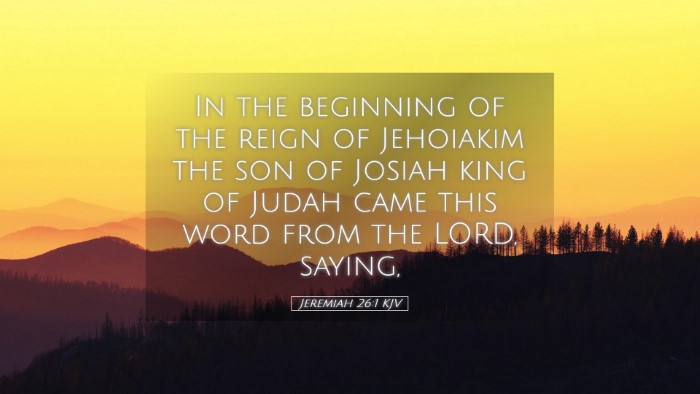Commentary on Jeremiah 26:1
Introduction
Jeremiah 26:1 reads: "In the beginning of the reign of Jehoiakim, the son of Josiah, king of Judah, came this word from the LORD, saying," This verse sets the stage for a prophetic declaration during a critical period in Judah's history. Understanding its context enhances its application for contemporary readers, making it particularly significant for pastors, theologians, and students of the Scripture.
Historical Context
The historical backdrop of Jeremiah 26:1 is crucial for grasping the full weight of the prophecy. Jehoiakim, who ascended to the throne under dubious circumstances, represents a period of spiritual decline and moral decay within Judah. As noted by Matthew Henry, Jehoiakim's reign was marked by an inclination towards idolatry and a disregard for the teachings of the Law. This opposition to God's commandments sets the stage for Jeremiah's ministry and the subsequent prophecies contained within the book.
The Prophetic Word
The phrase "came this word from the LORD" emphasizes the divine origin of Jeremiah’s message. Adam Clarke highlights the significance of God’s word in the prophetic tradition, noting that it is not merely a human utterance but a revelation that calls for attention and reverence. The call to prophetic ministry often begins with an unmistakable communication from God, and Jeremiah's life exemplifies this divine summons.
The Significance of Timing
The opening phrase "In the beginning of the reign of Jehoiakim" serves a dual purpose. Firstly, it indicates a time of transition which is often pivotal in biblical narratives. Albert Barnes points out that God often sends His prophets at crucial times to provide guidance and correction as nations grapple with leadership changes. The commencement of Jehoiakim’s reign was especially challenging, as Judah was vulnerable not only politically but also spiritually.
Furthermore, the beginning of Jehoiakim's reign can be seen as a metaphorical beginning for Judah as a whole. It is a time when the decisions made could either lead towards restoration or further decline. This alludes to the larger theme of repentance and the continuous call for reform that God extends through His prophets.
Application for Today
The implications of Jeremiah 26:1 extend beyond its immediate historical context. In the modern ecclesiastical landscape, leaders must consistently seek God's guidance, especially during times of change and uncertainty. As Matthew Henry remarks, church leaders and congregations face similar challenges today, requiring a firm grounding in God’s Word to navigate the complexities of contemporary society.
- Seeking God in Leadership: Just as Jehoiakim's reign called for prophetic insight, today’s leaders are reminded to seek divine wisdom in their governance and decision-making.
- The Role of Prophetic Voices: Jeremiah's call illustrates the necessity of prophetic ministry, emphasizing that God still speaks through His ordained servants, challenging both congregations and leaders alike to heed His voice.
- The Importance of Timing: The recognition of divine timing is critical. Leaders must be sensitive to God’s timing in matters of ministry and doctrine.
Conclusion
Jeremiah 26:1 serves as a solemn reminder of the importance of prophetic ministry and divine guidance in both ancient Israel and modern church contexts. The weight of what it means for a word to come from the Lord should invoke a sense of responsibility among all who profess to lead in spiritual matters. As we reflect upon this verse, may we strive to cultivate an environment receptive to God's leading, acknowledging the significance of His voice amidst the myriad of influences that surround us.
In conclusion, let us be diligent in our pursuit of understanding the profound lessons contained within this single verse, encouraging one another in faith, knowledge, and adherence to God’s unfailing truths.


